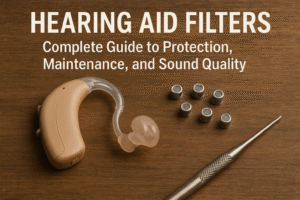
Hearing is one of our most valuable senses, enabling us to stay connected with loved ones and remain aware of the world around us. But as we grow older, hearing often declines—a condition known as age-related hearing loss or presbycusis. While this change is natural, it doesn’t mean seniors must accept isolation or poor communication. With the right senior hearing care, lifestyle changes, and technology, it’s possible to maintain and even improve hearing health in later years.
This guide will explore practical strategies on how to improve hearing in old age, from simple hearing exercises to a diet for hearing health, and when to consider an elderly hearing aid. We’ll also share science-backed age-related hearing loss tips that can make a big difference in everyday life.
Understanding Hearing Loss in Seniors
Before we dive into solutions, let’s understand why hearing declines with age:
- Degeneration of inner ear hair cells – These tiny cells in the cochlea gradually lose function (how hearing aids works).
- Changes in the auditory nerve – Signal transmission to the brain becomes less efficient.
- Cumulative noise exposure – Years of loud sounds (music, work environments, traffic) contribute to damage.
- Medical conditions – Diabetes, cardiovascular disease, and high blood pressure can worsen hearing.
- Medication side effects – Certain drugs (called ototoxic medications) may impair hearing.
While hearing loss in seniors is common, it’s not inevitable. Early detection and proactive care, like hearing tests in Cambodia, can preserve hearing for longer.
Senior Hearing Care: Building Healthy Habits
Senior hearing care starts with awareness. Simple lifestyle changes can prevent further decline and improve daily hearing function.
- Get regular hearing tests: Annual check-ups help detect early changes.
- Avoid loud environments: Use ear protection when exposed to noise.
- Stay socially active: Engaging in conversations keeps the brain sharp and supports hearing comprehension.
- Clean ears safely: Avoid cotton swabs; use professional cleaning if earwax is an issue (ear cleaning tips).
- Stay consistent with care: Treat hearing health like vision or dental care—regular and preventive.
Hearing Exercises for the Elderly
Just like physical fitness, auditory fitness matters. Hearing exercises can strengthen listening skills and train the brain to process sounds more effectively.
Common Hearing Exercises:
- Sound Identification Practice
Sit in a quiet room, close your eyes, and ask someone to make different sounds (keys jingling, clapping, footsteps). Try to identify each sound. - Conversation Focus Training
Practice listening to one person in a group conversation and filter out background chatter. This sharpens focus in noisy environments. - Reading Aloud While Listening
Play an audiobook while following along with the text. This strengthens the brain’s ability to connect words with sounds. - Directional Hearing Practice
Have a friend call your name from different directions. Identify where the sound is coming from.
Regular hearing exercises improve comprehension and reduce listening fatigue.
Diet for Hearing Health
What you eat influences how well your ears function. A balanced diet for hearing health can slow down or even prevent hearing decline.
Key Nutrients for Hearing:
- Omega-3 fatty acids: Found in fish, they support blood flow to the inner ear.
- Vitamin B12 and folate: Help protect nerve pathways. Found in eggs, leafy greens, and beans.
- Magnesium: Shields inner ear cells from noise damage (spinach, bananas, nuts).
- Zinc: Boosts immune function and protects against ear infections (pumpkin seeds, shellfish).
- Antioxidants (Vitamins A, C, E): Protect against cellular aging (fruits and vegetables).
Hydration and Moderation:
- Drink enough water to maintain ear fluid balance.
- Limit excessive salt and caffeine, as they may affect blood circulation in the inner ear.
Eating a nutrient-rich diet benefits not only hearing but also overall health in old age.
Elderly Hearing Aids: A Modern Solution
When natural methods aren’t enough, elderly hearing aids can make a life-changing difference. Today’s devices are discreet, powerful, and tailored for seniors’ needs.
Benefits of Hearing Aids for Seniors:
- Clearer conversations in noisy environments.
- Reduced listening strain and fatigue.
- Improved safety by hearing alarms, traffic, and alerts.
- Boosted confidence and independence.
Types of Elderly Hearing Aids:
- Behind-the-ear (BTE): Easy to handle and durable (Signia hearing aids)
- Receiver-in-canal (RIC): Small, comfortable, with clear sound (Phonak hearing aids)
- In-the-ear (ITE): Custom-fitted for comfort (CIC hearing aids)
- Rechargeable models: Convenient for seniors who don’t want frequent battery changes
Fitting and programming by a professional audiologist ensures maximum benefit.
Age-Related Hearing Loss Tips
Here are some everyday age-related hearing loss tips seniors can use:
- Face people when talking: Lip-reading and facial cues support comprehension.
- Reduce background noise: Turn off the TV or move to a quieter room for conversations.
- Use assistive devices: TV amplifiers, captioning services, or smartphone hearing apps.
- Stay physically active: Good cardiovascular health improves blood flow to the auditory system.
- Don’t ignore early signs: Seek help when speech starts sounding muffled or when asking people to repeat themselves becomes frequent.
The Emotional Side of Hearing Loss in Old Age
Hearing loss isn’t just physical—it also impacts mental and emotional health. Seniors may feel isolated, anxious, or even depressed when communication becomes difficult. Addressing hearing early with senior hearing care reduces the risk of social withdrawal and cognitive decline.
Studies show that using hearing aids or following hearing health tips significantly lowers the risk of dementia and depression in older adults.
The Role of Family in Senior Hearing Care
Support from family makes a big difference in managing hearing issues:
- Encourage regular hearing tests.
- Speak clearly, without shouting.
- Maintain eye contact during conversations.
- Be patient and understanding.
- Help with hearing aid maintenance if needed.
Family involvement ensures seniors feel supported rather than burdened.
Future of Senior Hearing Care
Technology is advancing rapidly, bringing exciting possibilities:
- AI-powered hearing aids that adjust automatically.
- Health-tracking features like heart rate and activity monitoring.
- Direct smartphone connectivity for easy control and streaming.
- Smaller, invisible devices for maximum comfort and discretion.
These innovations will make it even easier for seniors to maintain hearing health.
Conclusion
Improving hearing in old age is not only possible but highly rewarding. Through proper senior hearing care, consistent hearing exercises, and a diet for hearing health, seniors can preserve their hearing abilities. When needed, elderly hearing aids provide a powerful solution to restore communication and confidence.
By following practical age-related hearing loss tips and seeking professional help early, older adults can enjoy clearer conversations, stronger social connections, and a better quality of life.







